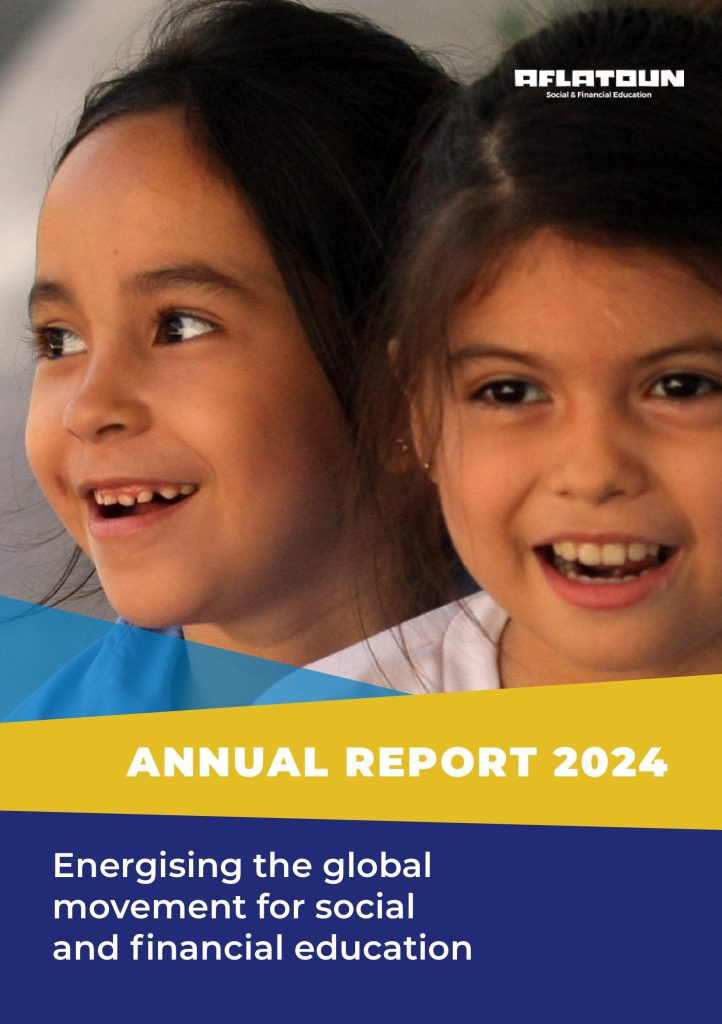Enda Inter-Arabe has been operating in Tunisia for 32 years and ever since its creation in 1990, it has been offering targeted and personalised training for young people to guide them in all stages of development. At the same time, it works to contribute to societal transformation through economic, social and cultural integration of vulnerable groups.
To carry out their work, Enda Inter-Arabe focuses on bridging the gender gap by empowering women to support their position in society and by promoting an entrepreneurial culture within marginalised communities. Moreover, to enable the effective implementation of courses, Ende Inter-Arabe works alongside civil society organisations, ministries and public institutions.
Our Partnership
The alignment of strategic goals between Aflatoun and Enda Inter-Arabe has managed to push forth social and financial education into the public primary education curriculum. In tune, herefore, the organisation uses Aflatoun material, adapted to the Tunisian context, as well as our AflaYouth curriculum, redefined and mirroring the realities of Tunisian youth.
Through this implementation, we continue to educate a generation on their social and financial responsibilities, improving their ability to manage available resources effectively.
Scaling Up: National Implementation of the Aflatoun Curriculum
Enda Inter-Arabe in partnership with Aflatoun has successfully adopted and expanded the social and financial education programme in Tunisia. Starting with an initial pilot project, they later scaled up to cover the entire country. Currently, over 150 educational professionals have been trained on the Aflatoun programme, and there are 90 active clubs in 85 public schools, engaging more than 1,600 children.

In 2023, with the support of stakeholders involved in the primary education curriculum reform and the collaboration of supervisors from Enda Inter-Arabe, a task force was established to integrate the concepts of social and financial education into the official teaching programme for primary schools in Tunisia. Consequently, this collaboration led to the development of detailed guidelines, alongside a pedagogical guide for teachers. In May, the first integration experiment of financial and social education within the classroom in public schools was launched with the third graders, involving 10 teachers in 10 schools. The experiment will be evaluated during the summer break, and efforts will be made to expand it with a larger number of participants in the upcoming academic year.
Kasserinefest Children’s Festival
At the end of this academic year, the “KASSERINEFEST Children’s Festival” took place in the Kasserine Governorate, located in the central-western part of Tunisia. This festival was initiated by Ende Inter-Arabe in coordination with the Aflatoun clubs in the region (23 clubs) and the Regional Directorate of Education.
The festival served to celebrate the end of a year of activities by the 23 Aflatoun Clubs operating in public schools in the region, where negative social phenomena such as school dropout, poverty, and violence often prevail. More than 15 clubs participated in the festival, gathering approximately 700 children. The festival provided an opportunity to promote the various activities of the clubs and establish partnerships.

The festival programme was rich and diverse, featuring theatrical and artistic performances by the children from the clubs. They addressed the importance of saving and conserving resources, promoting human values for social harmony, and emphasizing the significance of responsible behaviours in our daily lives.
The openness of the clubs to their social, economic, and cultural environments, along with the collaboration among the teachers managing the clubs, their commitment, and the active participation of parents and non-governmental organisations, contributed to the success of the event. Participants encouraged the establishment of the festival as an annual event held at the end of each academic year, with the goal of developing it into a national event.













